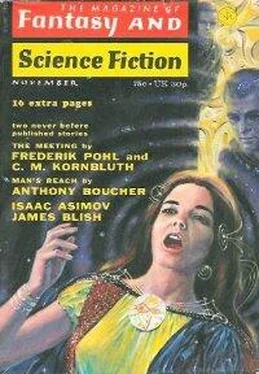Frederik Pohl - The Meeting
Здесь есть возможность читать онлайн «Frederik Pohl - The Meeting» весь текст электронной книги совершенно бесплатно (целиком полную версию без сокращений). В некоторых случаях можно слушать аудио, скачать через торрент в формате fb2 и присутствует краткое содержание. Год выпуска: 1972, Издательство: Mercury Press, Inc., Жанр: Фантастика и фэнтези, на английском языке. Описание произведения, (предисловие) а так же отзывы посетителей доступны на портале библиотеки ЛибКат.
- Название:The Meeting
- Автор:
- Издательство:Mercury Press, Inc.
- Жанр:
- Год:1972
- ISBN:нет данных
- Рейтинг книги:4 / 5. Голосов: 1
-
Избранное:Добавить в избранное
- Отзывы:
-
Ваша оценка:
- 80
- 1
- 2
- 3
- 4
- 5
The Meeting: краткое содержание, описание и аннотация
Предлагаем к чтению аннотацию, описание, краткое содержание или предисловие (зависит от того, что написал сам автор книги «The Meeting»). Если вы не нашли необходимую информацию о книге — напишите в комментариях, мы постараемся отыскать её.
The Meeting — читать онлайн бесплатно полную книгу (весь текст) целиком
Ниже представлен текст книги, разбитый по страницам. Система сохранения места последней прочитанной страницы, позволяет с удобством читать онлайн бесплатно книгу «The Meeting», без необходимости каждый раз заново искать на чём Вы остановились. Поставьте закладку, и сможете в любой момент перейти на страницу, на которой закончили чтение.
Интервал:
Закладка:
The Meeting
by Frederik Pohl and Cyril Kornbluth
Harry Vladek was too large a man for his Volkswagen, but he was too poor a man to trade it in, and as things were going he was going to stay that way a long time. He applied the brakes carefully ("master cylinder’s leaking like a sieve, Mr. Vladek. What’s the use of just fixing up the linings?"—but the estimate was a hundred and twenty-eight dollars, and where was it going to come from?) and parked in the neatly graveled lot. He squeezed out of the door, the upsetting telephone call from Dr. Nicholson on his mind, locked the car up, and went into the school building.
The Parent-Teachers Association of the Bingham County School for Exceptional Children was holding its first meeting of the term. Of the twenty people already there, Vladek knew only Mrs. Adler, the principal, or headmistress, or owner of the school. She was the one he needed to talk to most, he thought. Would there be any chance to see her privately? Right now she sat across the room at her scuffed golden-oak desk in a posture chair, talking in low, rapid tones with a gray-haired woman in a tan suit. A teacher? She seemed too old to be a parent, although his wife had told him some of the kids seemed to be twenty or more.
It was 8:30 and the parents were still driving up to the school, a converted building that had once been a big country house-almost a mansion. The living room was full of elegant reminders of that. Two chandeliers. Intricate vineleaf molding on the plaster above the dropped ceiling. The pink-veined, white-marble fireplace, unfortunately prominent because of the unsuitable andirons, too cheap and too small, that now stood in it. Golden-oak, sliding double doors to the hall. And visible through them a grim, fireproof staircase of concrete and steel. They must, Vladek thought, have had to rip out a beautiful wooden thing to install the fireproof stairs for compliance with the state school laws.
People kept coming in, single men, single women, and occasionally a couple. He wondered how the couples managed their baby-sitting problem. The subtitle on the school’s letterhead was “an institution for emotionally disturbed and cerebrally damaged children capable of education.” Harry’s nine-year-old Thomas was one of the emotionally disturbed ones. With a taste of envy he wondered if cerebrally damaged children could be baby-sat by any reasonably competent grown-up. Thomas could not. The Vladeks had not had an evening out together since he was two, so that tonight Margaret was holding the fort at home, no doubt worrying herself sick about the call from Dr. Nicholson, while Harry was representing the family at the PTA.
As the room filled up, chairs were getting scarce. A young couple was standing at the end of the row near him, looking around for a pair of empty seats. “Here,” he said to them. “I’ll move over.” The woman smiled politely and the man said thanks. Emboldened by an ashtray on the empty seat in front of him, Harry pulled out his pack of cigarettes and offered it to them, but it turned out they were nonsmokers. Harry lit up anyway, listening to what was going on around him.
Everybody was talking. One woman asked another, “How’s the gall bladder? Are they going to take it out after all?” A heavy-balding man said to a short man with bushy sideburns, “Well, my accountant says the tuition’s medically deductible if the school is for psychosomatic, not just for psycho. That we’ve got to clear up.” The short man told him positively, “Right, but all you need is a doctor’s letter: he recommends the school, refers the child to the school.” And a very young woman said intensely, “Dr. Shields was very optimistic, Mrs. Clerman, He says without a doubt the thyroid will make Georgie accessible. And then—” A light-coffee-colored black man in an aloha shirt told a plump woman, “He really pulled a wingding over the weekend, two stitches in his face, busted my fishing pole in three places.” And the woman said, “They get so bored. My little girl has this thing about crayons, so that rules out coloring books altogether. You wonder what you can do.”
Harry finally said to the young man next to him, “My name’s Vladek. I’m Tommy’s father. He’s in the beginners group.”
“That’s where ours is,” said the young man. “He’s Vern, Six years old. Blond like me. Maybe you’ve seen him.”
Harry did not try very hard to remember. The two or three times he had picked Tommy up after class he had not been able to tell one child from another in the great bustle of departure. Coats, handkerchiefs, hats, one little girl who always hid in the supply closet and a little boy who never wanted to go home and hung onto the teacher. “Oh, yes,” he said politely.
The young man introduced himself and his wife; they were named Murray and Celia Logan. Harry leaned over the man to shake the wife’s hand, and she said, “Aren’t you new here?”
“Yes. Tommy’s been in the school a month. We moved in from Elmira to be near it.” He hesitated, then added, “Tommy’s nine, but the reason he’s in the beginners group is that Mrs. Adler thought it would make the adjustment easier.”
Logan pointed to a suntanned man in the first row. “See that fellow with the glasses? He moved here from Texas . Of course, he’s got money.”
“It must be a good place,” Harry said questioningly.
Logan grinned, his expression a little nervous.
“How’s your son?” Harry asked.
“That little rascal,” said Logan. “Last week I got him another copy of the My Fair Lady album, I guess he’s used up four or five of them, and he goes around singing luv-er-ly, luv-er-ly.’ But look at you? No.”
“Mine doesn’t talk,” said Harry.
Mrs. Logan said judiciously, “Ours talks. Not to anybody, though. It’s like a wall.”
“I know,” said Harry, and pressed. “Has, ah, has Vern shown much improvement with the school?”
Murray Logan pursed his lips. “I would say, yes. The bedwetting’s not too good, but life’s a great deal smoother in some ways. You know, you don’t hope for a dramatic breakthrough. But in little things, day by day, it goes smoother. Mostly smoother. Of course there are setbacks.”
Harry nodded, thinking of seven years of setbacks, and two years of growing worry and puzzlement before that. He said, “Mrs. Adler told me that, for instance, a special outbreak of destructiveness might mean something like a plateau in speech therapy. So the child fights it and breaks out in some other direction.”
“That too,” said Logan, “but what I meant—Oh, they’re starting.”
Vladek nodded, stubbing out his cigarette and absent-mindedly lighting another. His stomach was knotting up again. He wondered at these other parents, who seemed so safe and well, untouched. Wasn’t it the same with them as with Margaret and himself? And it had been a long time since either of them had felt the world comfortable around them, even without Dr. Nicholson pressing for a decision. He forced himself to lean back and look as tranquil as the others.
Mrs. Adler was tapping her desk with a ruler. “I think everybody who is coming is here,” she said. She leaned against the desk and waited for the room to quiet down. She was short, dark, plump, and surprisingly pretty. She did not look at all like a competent professional. She looked so unlike her role that, in fact, Harry’s heart had sunk three months ago when their correspondence about admitting Tommy had been climaxed by the long trip from Elmira for the interview. He had expected a steel-gray lady with rimless glasses, a Valkyrie in a white smock like the nurse who had held wriggling, screaming Tommy while waiting for the suppository to quiet him down for his first EEC, a disheveled old fraud, he didn’t know what. Anything except this pretty young woman. Another blind alley, he had thought in despair. Another, after a hundred too many already. First, “Wait for him to outgrow it.” He doesn’t. Then, “We must reconcile ourselves to God’s will.” But you don’t want to. Then give him the prescription three times a day for three months. And it doesn’t work. Then chase around for six months with the Child Guidance Clinic to find out it’s only letterheads and one circuit-riding doctor who doesn’t have time for anything. Then, after four dreary, weepy weeks of soul-searching, the State Training School, and find out it has an eight-year waiting list. Then the private custodial school, and find they’re fifty-five hundred dollars a year—without medical treatment!—and where do you get fifty-five hundred dollars a year? And all the time everybody warns you, as if you didn’t know it: “Hurry! Do something! Catch it early! This is the critical stage! Delay is fatal!” And then this soft-looking little woman; how could she do anything?
Читать дальшеИнтервал:
Закладка:
Похожие книги на «The Meeting»
Представляем Вашему вниманию похожие книги на «The Meeting» списком для выбора. Мы отобрали схожую по названию и смыслу литературу в надежде предоставить читателям больше вариантов отыскать новые, интересные, ещё непрочитанные произведения.
Обсуждение, отзывы о книге «The Meeting» и просто собственные мнения читателей. Оставьте ваши комментарии, напишите, что Вы думаете о произведении, его смысле или главных героях. Укажите что конкретно понравилось, а что нет, и почему Вы так считаете.












